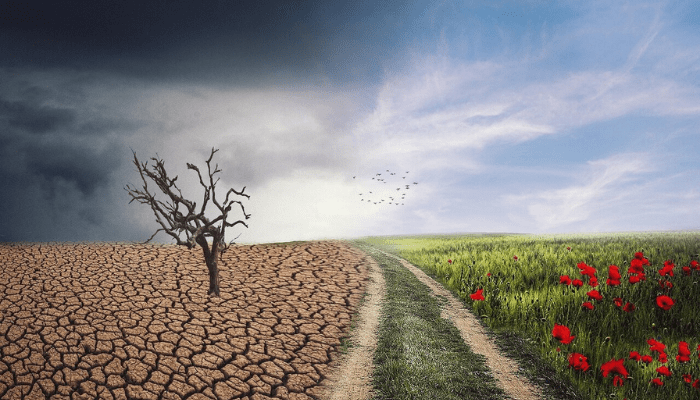Climate change has a far-reaching impact beyond just the natural world, including its effects on wildlife and melting glaciers. The impact of climate change affects not only nature but also humankind. It has a significant impact on our health, both currently and in the future.
The increase in temperature leads to heatstroke, respiratory problems, and the spread of diseases, which negatively affect our mental and physical health.
Therefore, it is crucial to take action to combat climate change and safeguard our health. It’s our duty to implement sufficient measures to address the impact of climate change and issues occurring due to it.
Here is how climate change damages our health and how we can tackle this challenge together.
Climate Change: A Serious Threat
Climate change signifies the long-term shifts in global or regional climate patterns that are primarily caused by human activities such as;
- Burning Fossil Fuels
- Deforestation
- Industrial Processes
These activities emit greenhouse gasses, like carbon dioxide, into the atmosphere, trap heat, and disturb the earth’s climate system.
The consequences of climate change include higher temperatures, changing weather patterns, rising sea levels, and, yes, of course, impacts on human health. Global warming is the most concerning impact of climate change on humans.
Climate Change: Its Impact on Human Health
Climate change has a significant impact on our health, disrupting the systems we depend on. The rise in temperatures worsens air quality, leading to respiratory problems.
Extreme weather events are also an impact of climate change. It hurts human health in various ways, such as floods, heat waves, and storms, which can result in injuries, deaths, and displacement.
Changes in precipitation affect water quality and quantity, increasing the chances of waterborne diseases.
Rising temperatures also allow disease-carrying insects like mosquitoes to move to new habitats. Such disruptions can cause stress, anxiety, and depression.
Overall, climate change affects everything from the air we breathe to the water we drink, posing a significant threat to our health. In addition to these noticeable impacts of climate change, some others may also exist that humans have not yet researched.
Climate Change caused health issues
Respiratory and Cardiovascular Diseases: Climate change can disturb air quality by increasing air pollution levels. This impact of climate change can lead to various health problems, including respiratory infections like pneumonia and bronchitis, and increase the chances of heart attacks.
Heat-related illnesses: Due to a change in climate, heat waves are occurring more often and with greater intensity. This can result in heat stroke, heat exhaustion, and dehydration. These illnesses are very serious and can even cause death, especially for older people, young kids, and those with ongoing health problems.
Waterborne and foodborne illnesses: Changes in weather patterns can result in more floods and droughts. These conditions can lead to water contamination and make it harder to cultivate food safely. As a result, the risks of contracting waterborne and foodborne illnesses arise, such as diarrhea and cholera.
Vector-borne diseases: Climate change is responsible for the spread of diseases that come through blood-feeding arthropods like mosquitoes, which means there’s a higher risk of getting illnesses like malaria, dengue fever, etc.
Mental Health Problems: The impact of climate change can have a severe effect on our mental health. It can cause us to feel worried, sad, or distressed, particularly when we experience extreme weather events, have to relocate, or lose our jobs due to the relocation.
How We Can All Combat Climate Change
There are several ways that healthcare facilities, communities, and individuals can take action to reduce the impact of climate change on human health.
Reduce Energy Consumption: Conserving energy is a highly effective way of fighting climate change. This can be attained by using energy-efficient appliances, turning off lights and electronics when they are not in use, and optimizing the heating and cooling machines, such as air conditioners, blowers, etc, at home or workplace.
Furthermore, we should consider using renewable energy sources like solar or wind power whenever possible. This will reduce the impact of climate change and save the earth and humans.
Sustainable Transportation: Modes of transportation that use fossil fuels are a leading cause of greenhouse gas emissions. To reduce our carbon footprint, we can choose to use eco-friendly modes of transportation such as cycling, cab sharing, or public transit whenever possible.
For longer distances, we should consider alternatives like electric vehicles or vehicles powered by clean fuels.
Renewable Energy: It is really important to invest in renewable energy sources like solar power, geothermal energy, wind power, and bioenergy. We should request policymakers to implement policies that enhance the growth and adoption of renewable energy technologies.
By shifting away from fossil fuels and looking towards renewable energy, we can decrease carbon emissions and tackle the effects of climate change.
Support 3Rs (Reduce, Reuse, Recycle): You should focus on living a lifestyle that emphasizes reducing waste, reusing items, and recycling. These can help preserve resources and reduce energy consumption and greenhouse gas emissions generated with the production of new items.
You should opt for products with minimal packaging, consider reusing items whenever possible, and recycle paper, glass, and plastic to minimize waste.
Endorse Events: To tackle and minimize the impact of climate change, you should join local and worldwide climate-saving events by backing groups, signing petitions, and participating in community projects centered on saving the environment.
You can use various platforms like social media to spread the word about how crucial it is to take action on climate change and inspire others to get involved in events.
Climate change is a major threat to human health as it can lead to several health risks, including respiratory illnesses and waterborne diseases. However, there is still hope. We can fight climate change and safeguard our health by adopting sustainable practices, using renewable energy, and reducing waste. Let’s work together to ensure a healthier planet for everyone.
Also read: All You Need to Know About Bird Flu or Avian Influenza
Frequently Asked Questions
What is climate change, and how does it impact our health?
Climate change means that the weather is changing over a long time. This includes things like higher temperatures, changing precipitation, and other environmental changes.
These changes can make us sick in different ways, like heat-related illnesses, the spread of diseases, and worsening air quality.
How is climate change responsible for heat-related illnesses?
Climate change increases the temperature; as temperatures rise, the risk of heat-related illnesses increases, and existing health conditions can worsen.
How does climate change impact infectious diseases?
Climate change can impact infectious diseases by increasing mosquitoes and ticks, which can cause diseases such as malaria, dengue fever, and Lyme disease.
How can individuals protect their health in a changing climate?
Individuals can protect their health by staying informed about local climate-related health risks, staying hydrated during heatwaves, and reducing the use of carbon-generating vehicles.
What is the significance of government policies in minimizing the health effects of climate change?
Effective government policies are crucial in mitigating and tackling the health impacts caused by climate change. They regulate greenhouse gas emissions, promote clean energy and transportation, and invest in public health infrastructure.











